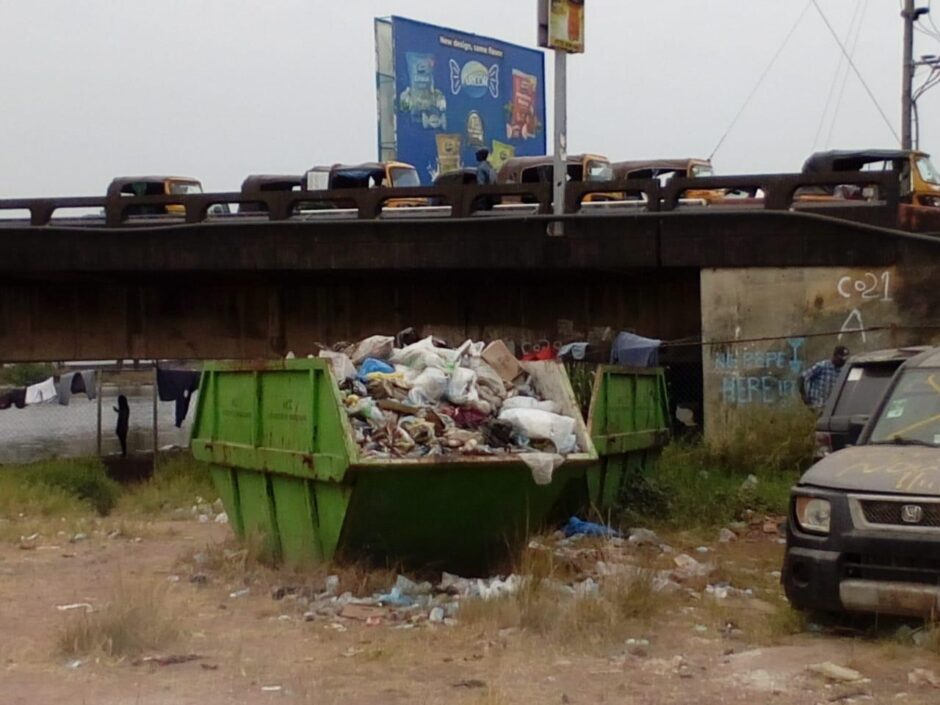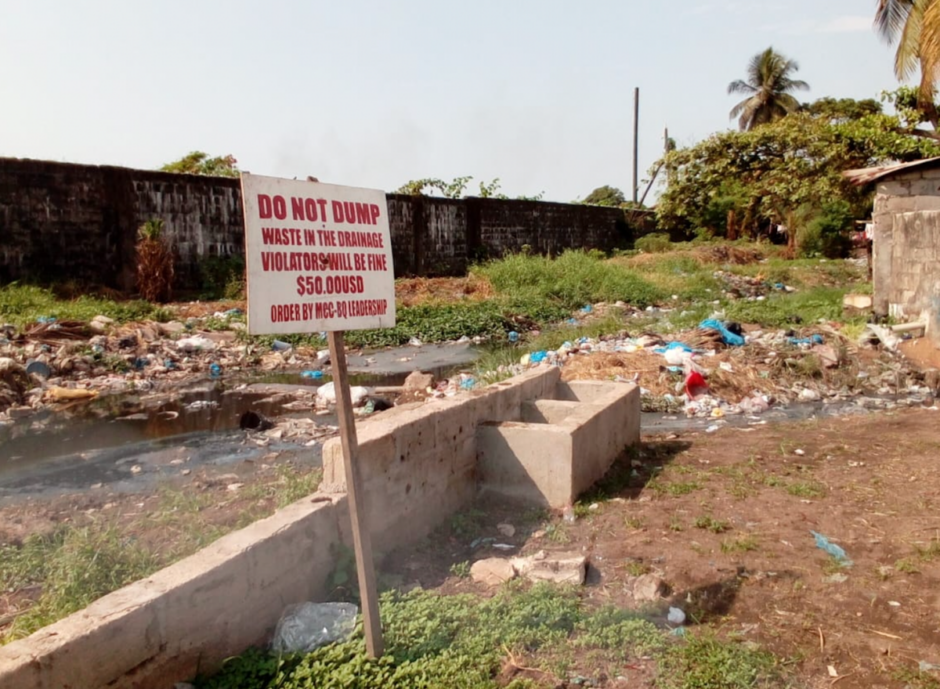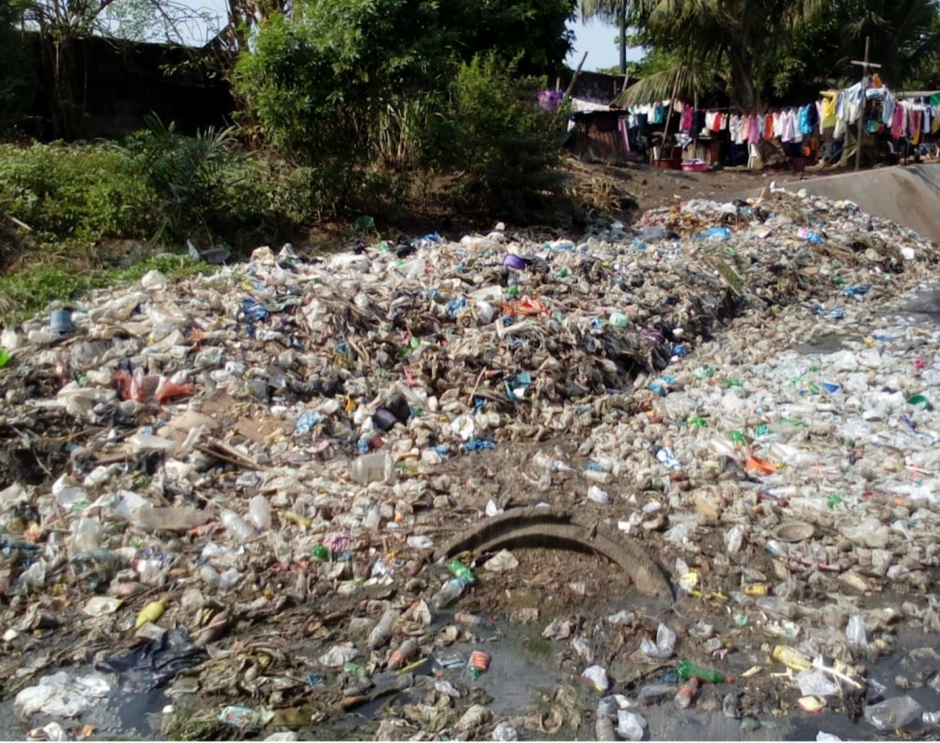
In part two of this two-part investigation Anthony Stephens and Tina S. Menhpaine report with New Narratives on the obstacles that doomed a $3m EU-funded waste management project.
In 2018 when the UK-based charity Cities Alliance embarked on an ambitious project to remake Monrovia’s waste management system, the brewing trash problem was already becoming obvious. The population of Greater Monrovia had increased by 70 percent since the end of the civil war in 2003, but that influx had not been matched by investment in the waste management system.
Garbage quickly became a full-on crisis that now makes life miserable for millions of people in Monrovia and Paynesville. Mountains of trash attract bugs and rodents, cause serious health problems and block drainage systems causing sanitation systems to overflow. The problem sparked a row in 2021 between Monrovia Mayor Jefferson Koijee and a frustrated diplomatic community that had invested millions in waste management. Ambassador Laurent Delahousse of the European Union told a forum “Monrovia is .. the dirtiest city of the many places I have visited in my work in Africa.”
Between 2015-2021, there were four major solid waste projects run by Cities Alliance and funded by the World Bank and EU focusing on waste management. The $US3 million “Delivering Climate-Resilient Solid Waste Management Services in Greater, Liberia Through Community-Based Enterprises” project was the last.
A year on from Cities Alliance’s March 2022 withdrawal from Liberia, a New Narratives/Daily Observer investigation found the project had failed on most measures. A micro-loan scheme designed to empower community-based enterprises (CBEs) to do recycling and composting never happened. Another “revolving” loan scheme for CBEs doing waste management handed out US$267,000 in loans but US$245,000 appears to have vanished.
An investigation could only establish that a handful of the loan recipients were operating as intended. Many had never operated at all or had moved into other businesses. The Technical Committee led by the Ministry of Internal Affairs, according to Cities Alliance, appears not to have monitored the loan repayments which should have been repaid in full by this month. The Ministry refused to provide documentation about the loan scheme but a report provided to NN/Daily Observer found just US$20,500 had been repaid.

Here in the Buzzi Quarter, an informal community in Monrovia, the project’s shortcomings are clear. In a 2021 report annual Cities Alliance claimed this community is one of more than 200 communities that gained sustainable and efficient waste management services during the project. Residents reject that.
“We have asked the central government to come to our aid, but no way. There is no community-based enterprise here. We take our own dirt (trash) to the sea. Cities Alliance has not worked with us,” said James Gono, Buzzi Quarter community chairman.
Trash flows from one corner to another between homes because the residents do not have anywhere to dump it. They burn, bury, or throw it in the Soinwein drainage that runs through the area.
In an email Cities Alliance claimed a committee led by the Ministry of Internal Affairs and including representatives from the Monrovia City Council, Paynesville City Council, Ecobank and the EPA was continuing to run the project successfully. Paulita Wie, Internal Affairs Deputy Minister for Urban Affairs, refused to answer questions in WhatsApp and emails about how the program was being managed. J. Saah Joe Kenedemah, head of the National Association of Community-Based Enterprises (NACOBE), the umbrella group of enterprises in waste management, said there is no ongoing oversight of the project. He calls it a failure.
”I don’t think we need any rocket scientist to tell us that the project is not successful,” said Kenedemah in an interview at his office. “Some people that did receive the loan, it was only when they called for the workshop that they were qualified. It was my first time to see them. They were not even part of the Association.”

Cities Alliance said the project was hampered by the Covid-19 pandemic and the failure to raise more donor funds to complete the project. “This meant that the anticipated future phases of the waste management project have not come to fruition,” said Yamila Castro, Communications Officer, in an email.
But by the time the CBE loans were given out in October 2021, so much was going wrong with the project that it is difficult to see how the Committee could have believed CBEs would be able to repay their loans.
A final independent evaluation of the project identified two major obstacles that had not been addressed when the loans were given out: The first was the failure of Monrovia and Paynesville City Corporations to provide enough bins or dump sites for the CBEs to dump trash. Though Cities Alliance claimed to have provided 60 skip buckets, the evaluator found they were constantly full. CBEs could not dump waste and so could not collect more garbage from households.
“The project is a total failure,” according to Augustine Paye, founder of People Waste and Pest Control, a CBE in Central Monrovia that benefited from the project.
Paye received a $US15,000 loan for waste management in Jallah town, Perry street, Capitol By-pass, Mustile and Konah communities. The CBEs are only allowed to “dump one time at the landfill in Whein Town, Bernard Farm, no matter the quantity of their waste,” according Paye.
CBEs faced penalties for dumping trash outside official dump sites, though some were forced to do so in an effort to keep customers. Without anywhere to dump the trash CBEs fell behind which led to “huge declines in customers.” Paye could nnot raise his customer numbers from 400 to 1200 as he promised in his loan agreement. Without an increase in paying customers he could not repay his loan.
MCC officials blamed a lack of fuel, resources to repair and maintain waste trucks for their failure to provide dump facilities. Government funding that was supposed to pay for logistics was allegedly diverted to the Covid-19 fight.
In Paynesville, six CBEs that received loans never even began operations because the Paynesville City Corporation did not provide them with a dump site. Jeremiah Diggen, PCC public relations officer, said although they had stopped accrediting the CBEs since June 2021, because the “transfer station” was closed. PCC registration had been a requirement in qualifying for the loan. Deputy Minister Wie did not answer questions as to how the Paynesville CBEs were given loans despite this missing criterion.

JEMB, a community-based waste company in Paynesville received US$10,000 to serve 72nd, A.B. Tolbert, Rehab, Police Academy, and Duport Road communities. Here, too, customers are unhappy.
“The food we sell here, when the bread stays for one or two days, it can be smelling,” said Ousman Jalloh, a JEMB customer. “They can’t collect our dirt (trash) on time. They (JEMB) can be complaining about their motorbikes. Even the workers can’t come on time.”
Jalloh, who runs a tea shop in 72nd and has been a client of JEMB for more than a year, said his neighbors have been tormenting him because his waste sits so long behind his shop.
Without dump sites CBEs were poorly equipped to challenge the second major obstacle identified in the project’s final evaluation: competition from unemployed youth known as “Zogoes”.
“Dem are better,” said Miatta Sonpon, a customer of JEMB in Du-Port. “Zogoes will not give you stories. Once you gave them L$50 or L$60, they will take your dirt and throw it away.”
Zogoes already had a robust business collecting waste from households when the Cities Alliance project started. Ironically, it was the MCC itself which had originally encouraged them to take up waste collection as a means of giving them jobs. The Zogoes charged far less than CBEs. They charge $LD10-30 per collection compared with CBEs’ charges of $LD100-150 per week for three-times-a-week service. The independent evaluator found that 81% of households paying for private waste collection services were using Zogoes, compared to 19% for CBEs.
The project evaluator identified several successes. Awareness among communities of waste management was found to be high. Draft policy documents and frameworks were developed to improve sector governance, regulation, and coordination. The WASH Commission was established in 2020 to provide sector governance. The report cited improved technical capacity of national, city and local government individuals and institutions working in the waste sector and a better organized and coordinated primary waste sector, with a strong CBE network organized around NACOBE. However, reporting by NN/Daily Observer raises serious questions about how well any of this has been sustained.
The evaluator recommended a big increase in funding for waste management in the national budget that would allow city corporations. More support was recommended for CBEs and it urged that households be compelled to subscribe to CBEs and penalized for using Zogoes.
The US$267,000 in loans to the 21 CBEs were to be fully repaid by this month. A new Call for Proposals was meant to identify more CBEs that could benefit from the loans. Deputy Minister Wie and Alvin Gono, Director for Urban Affairs at the Ministry of Internal Affairs and head of the Steering Committee, according to Kenedemah, did not respond to requests for information about whether the Call for Proposals would go ahead. Meanwhile, across Monrovia and Paynesville trash problems keep getting worse by the day.
In part two of this two-part investigation Anthony Stephens and Tina S. Menhpaine report with New Narratives on the obstacles that doomed a $3m EU-funded waste management project.
This story was a collaboration with New Narratives as part of the Investigating Liberia project. Funding was provided by the Swedish Embassy in Liberia. The funder had no say in the story’s content.
